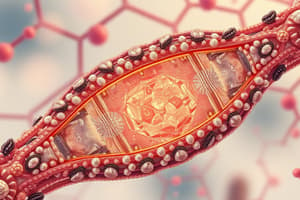Podcast
Questions and Answers
What is a glycoprotein?
What is a glycoprotein?
- A peripheral protein
- A protein with carbohydrate groups attached to it (correct)
- A type of fatty acid
- A lipid molecule
What is a glycolipid?
What is a glycolipid?
A lipid with a carbohydrate attached to it
What is a peripheral protein?
What is a peripheral protein?
A protein that is not embedded in the lipid bilayer
What are integral proteins?
What are integral proteins?
What is a lipid bilayer?
What is a lipid bilayer?
What are fatty acid tails?
What are fatty acid tails?
What are polar heads?
What are polar heads?
Flashcards are hidden until you start studying
Study Notes
Glycoprotein
- Consists of proteins bound to carbohydrate molecules.
- Plays crucial roles in cell recognition, signaling, and immune response.
- Commonly found on the plasma membrane surface.
Glycolipid
- Comprises lipids with carbohydrate attachments.
- Important for cell signaling and maintaining cell stability.
- Found in the plasma membrane; contribute to the overall structure.
Peripheral Protein
- Located on the inner or outer surface of the membrane.
- Not embedded in the lipid bilayer; can be easily removed.
- Involved in signaling pathways and maintaining membrane structure.
Integral Proteins
- Span the entire lipid bilayer, with parts exposed to both the extracellular and intracellular environments.
- Essential for transporting substances across the membrane.
- Often serve as channels or receptors for signaling molecules.
Lipid Bilayer
- Composed of two layers of phospholipids, providing a barrier to most water-soluble substances.
- Hydrophobic fatty acid tails face inward, while polar heads face outward.
- Fundamental to the structure and function of the plasma membrane.
Fatty Acid Tails
- Hydrophobic portions of phospholipids that prevent the passage of polar substances.
- Play a vital role in membrane fluidity and flexibility.
- Their length and saturation level can affect membrane properties.
Polar Heads
- Hydrophilic regions of phospholipids that interact with the aqueous environment.
- Essential for forming the outer surfaces of the lipid bilayer.
- Aid in cell signaling by interacting with other molecules in the external environment.
Studying That Suits You
Use AI to generate personalized quizzes and flashcards to suit your learning preferences.




